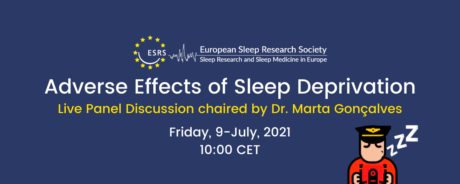Sleep Science Friday: Adverse Effects of Sleep Deprivation Webinar
11 June 2021
We all know that sleep is an essential function and yet, many times we are denied this daily opportunity to recharge mentally and physically in order to remain healthy. Getting little to no sleep is not always a choice for some if you consider those suffering from sleep apnoea, chronic insomnia, snoring and other sleep disorders. However, for others it is sometimes a personal choice or simply a side effect of shift work or travelling through different time zones.
Sleep deprivation describes a state caused by inadequate quantity or quality of sleep, including voluntary or involuntary sleeplessness and circadian rhythm sleep disorders.
The ideal amount of sleep for adults is between 7 and 9 hours1, more for children. Not meeting this sleep quota regularly has myriad consequences for how we function on a day-to-day basis.
Understanding the effect of sleep deprivation on all aspects of our lives is a crucial point for discussion. This is especially so as it has a direct and significant impact on traffic accidents, work injuries and academic performance.

To address these issues in detail, on Friday, 9-July at 10:00 CET, the ESRS will host a LIVE Webinar on the Adverse Effects of Sleep Deprivation, with presentations touching on various aspects including academics and flying, as well as the overall impact on global health.
This will be chaired by Dr. Marta Gonçalves who also led the charge on the Wake-Up Bus in 2014. She will be joined by two other presenters who will then lead an interactive discussion afterwards including the participants.
Dr. Bárbara Strazisar will address the effect of sleep deprivation on academic performance: Academic performance induced by poor sleep. What could be done to avoid it?
Prof. Torbjörn Åkerstedt has made several studies for the aviation industry and will present on: Flight time regulation and aircrew sleep duration and sleepiness.
Registration is required and is open until 30-June. Don’t delay in securing your spot!
Also, a few important to things to note about the webinar:
- Cost: participation is free for ALL
- Duration: approximately 90 minutes
- Replay: available on demand as an ESRS membership benefit
Recent publications from ESRS members:
- Revol et al. (2021). Diuretics in Obstructive Sleep Apnea Patients with Concomitant Hypertension. Ann Am Thorac Soc.
- Avellan-Hietanen et al. (2021). Adherence to CPAP therapy for sleep apnea in patients aged over 70 years old. Sleep Breath.
- Huttunen et al. (2021). Assessment of Obstructive Sleep Apnea-Related Sleep Fragmentation Utilizing Deep Learning-Based Sleep Staging from Photoplethysmography. Sleep.
- Meth et al. (2021). Sleep duration regularity as a predictor of the cardiovascular response to acute exercise. Sleep.
- Vigorè et al. (2021). Neuropsychological and executive screening in obstructive sleep apnea: early effect of ventilatory therapy. Minerva Med.
- Galbiati et al. (2021). The reliability of objective total sleep time in predicting the effectiveness of cognitive-behavioral therapy for insomnia. Sleep Med.
- DelRosso et al. (2021). Sleep spindles in children with restless sleep disorder, restless legs syndrome and normal controls. Clin Neurophysiol.
- Weitzer et al. (2021). Sleep complaints in former and current night shift workers: findings from two cross-sectional studies in Austria. Chronobiol Int.
- Dos Santos Lima et al. (2021). Disruption of neocortical synchronisation during slow-wave sleep in the rotenone model of Parkinson’s disease. J Sleep Res.
- Challamel et al. (2021). A video polysomnographic study of spontaneous smiling during sleep in newborns. J Sleep Res.
Just published an article? Want your research to be featured? Saw something interesting? Contact us at ESRS…
ESRS Reminders
RNC Call for New Effective Members
Are you interested in stepping up your contribution to the work of ESRS? The Research Network Committee (RNC) has just launched its Call for New Effective Members.
They’re seeking a Project Manager to investigate the possibilities and eventually set up an ESRS Foundation, in line with their mission to promote collaborations and information exchange between different fields within sleep research.
Applications will be accepted until 30-June. Here’s more information on the project and how to apply.
Sources
- Hirshkowitz et al. (2015). National Sleep Foundation’s sleep time duration recommendations: methodology and results summary. Sleep Health



